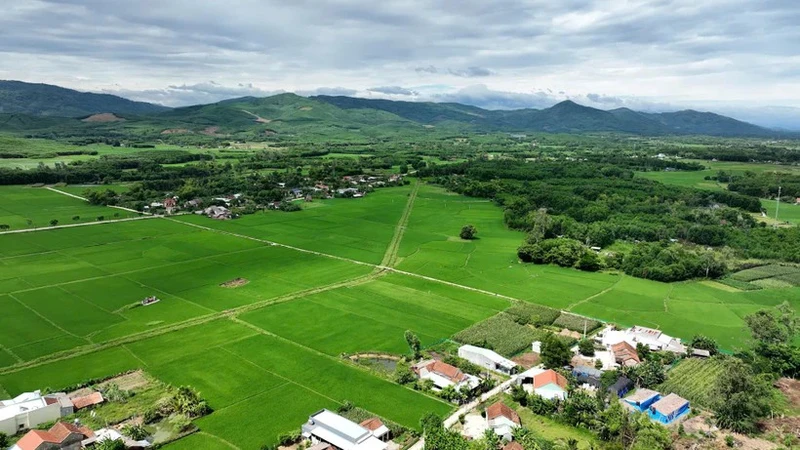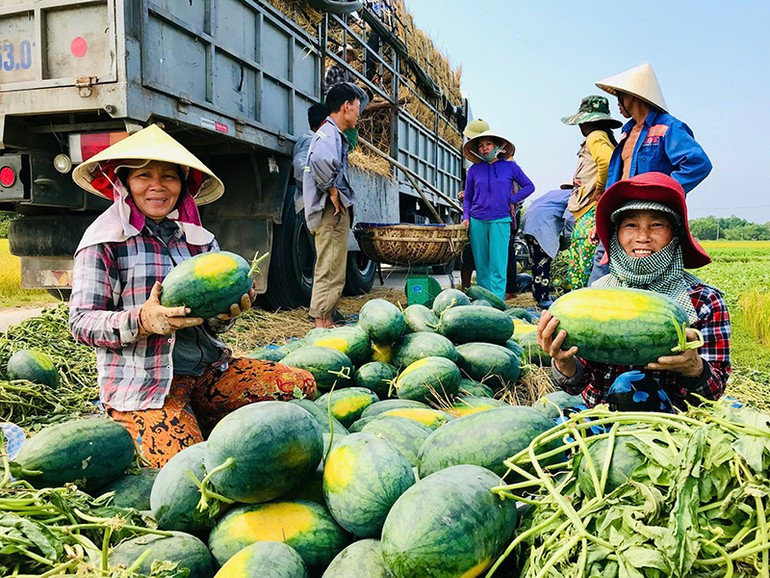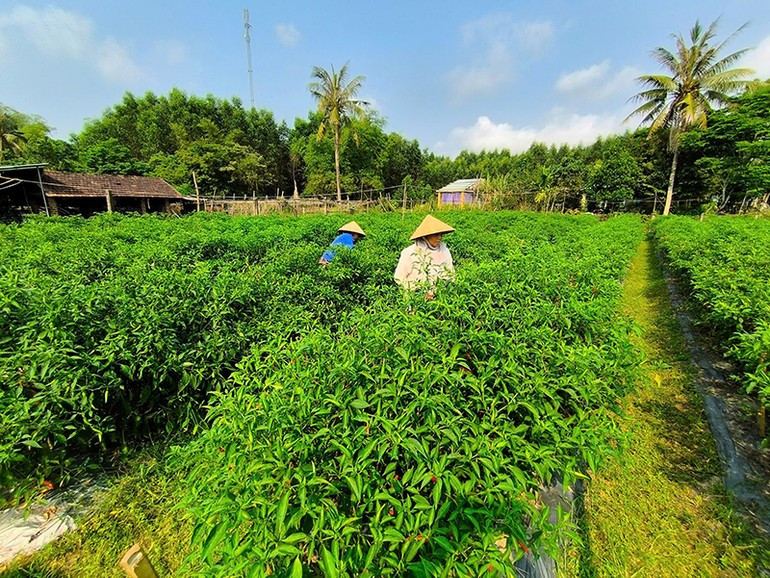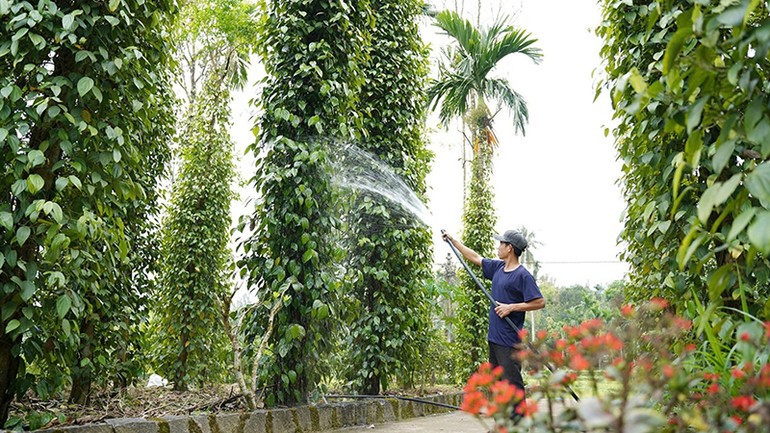Creating momentum for breakthrough in agriculture
In recent years, Quang Nam Province has restructured its agricultural sector towards enhancing added value and sustainable development, while promoting organic and circular agriculture. Smart farming methods and high-tech applications have been introduced to improve productivity and quality, diversify products, meet market demands, and increase incomes for local farmers.

According to the provincial master plan for 2021–2030, with a vision to 2050, agriculture will remain a key pillar of Quang Nam’s socio-economic development.
Restructuring the Agricultural Sector
In Tien Phuoc District, mangosteen has become one of the main crops, generating relatively stable economic returns for local farmers. Over the past few years, the district has effectively leveraged garden and farm-based economic development policies to help residents in Tien My, Tien Chau, Tien Canh, Tien Ha communes and Tien Ky township transition from low-yield crops to mangosteen cultivation.
Many households have boldly invested in smart irrigation systems using artificial intelligence, enabling them to monitor watering schedules and crop development via smartphones. This marks a positive shift in the adoption of high technology and digital transformation in farming.
As part of agricultural restructuring efforts, in 2024, Tien Phuoc District allocated 6.8 billion VND to support 155 households developing garden-based economies with digitised planting areas. So far, nearly 1,300 households have benefited from support to develop new gardens and farms, with a total budget of approximately 40 billion VND.
This has enabled over 1,500 households to participate in value chain-based production models, contributing to the establishment and branding of local speciality crop zones and increasing yield and economic value per unit of cultivated land.
In 2024, the district's total annual crop area was estimated at 5,652 hectares, reaching 104.31% of the target.
Nguyen Hung Anh, Vice Chairman of the Tien Phuoc District People’s Committee, noted that the income from garden and farm economies had risen from 120 million VND per hectare in 2020 to nearly 170 million VND per hectare in 2024, and is expected to reach 172 million VND per hectare in 2025.
"Tien Phuoc aims for garden and farm-based economic production to contribute over 40% of the district’s total agricultural output," Nguyen Hung Anh stated.

In contrast, Phu Ninh District has identified the lack of concentrated production zones and raw material areas as a major challenge in developing agricultural economies. Most agricultural land remains under individual ownership, and many landowners are reluctant to lease their land to enterprises seeking to establish large-scale crop production zones. This has hindered efforts to attract substantial investment into agriculture.
In response, the district has shifted its focus towards developing larger-scale cooperatives to restructure agriculture with an emphasis on increasing production linkages and product value.
Currently, Phu Ninh is home to 49 agricultural cooperatives, of which 37 are operating effectively. According to the District People's Committee, the district plans to establish four more cooperatives in the agricultural sector, expand membership and business scale, promote inter-cooperative partnerships, and encourage 40–50% of all agricultural, forestry, and livestock households in the area to join.
The goal is to ensure each cooperative generates at least 2 billion VND in annual revenue and aligns with the production and business needs of key agricultural sectors and OCOP (One Commune One Product) products. The district will also focus resources on developing at least one sustainable, high-performing agricultural cooperative model that suits local conditions.

Tran Quoc Doanh, Vice Chairman of Phu Ninh District People’s Committee, stated that the district is committed to improving the performance and sustainability of agricultural cooperatives through science and technology, innovation, and digital transformation. Priority will be given to cooperatives aligned with green and circular economic development. The district also aims to expand scale and participation, turning agricultural cooperatives into key socio-economic models in rural areas, thereby enhancing productivity, quality, and farmer incomes.
Positioning agricultural brands
In implementing the national Strategy for Sustainable Agriculture and Rural Development for 2021–2030, with a vision to 2050, and Quang Nam’s Provincial Party Committee Conclusion No. 91-KL/TU on sustainable agricultural and rural development in conjunction with new-style rural area building for 2021–2025, with orientation to 2030, Quang Nam’s agricultural sector has taken proactive steps. It has maximised available resources, shifted strongly to a market-oriented agricultural mindset, and effectively implemented projects and resolutions to promote sectoral development, address production and business challenges, and ensure social welfare.
The year 2024 marked a major success for Quang Nam’s agricultural sector, with production value exceeding 16.2 trillion VND, a 3.3% increase compared to 2023. Agriculture alone contributed nearly 9.8 trillion VND, helping stabilise the province’s socio-economic situation.
Statistics show that in 2024, the cultivated area reached over 83,000 hectares (100% of the plan), with yields estimated at over 5.8 tonnes per hectare—an increase of over 0.2 tonnes compared to 2023—and rice output surpassing 485,000 tonnes (up by 19,800 tonnes from 2023).
To date, Quang Nam has implemented 75 agricultural linkage projects in crop and livestock production, including 66 projects in rice, vegetables, fruit trees, and livestock. These projects have attracted 113 cooperatives and enterprises and engaged more than 17,000 households in the production chain.
According to the rovincial master plan for 2021–2030, with a vision to 2050, agriculture remains a central pillar in Quang Nam’s socio-economic development strategy.
Over seven years of implementing the OCOP programme (2018–2024), the province has had 479 products from 376 producers recognised as OCOP items, including 419 three-star and 60 four-star products. In early 2025, Quang Nam for the first time had two products achieve the prestigious five-star OCOP certification.

Vice Chairman of the Provincial People's Committee Ho Quang Buu shared that Quang Nam has proactively adapted to climate change in agricultural production by implementing solutions such as adjusting crop structures and developing irrigation systems. At the same time, agricultural products must move towards organic production and meet the standards and requirements of various markets. Crucially, Quang Nam's agricultural products must establish strong brands to mitigate risks and build recognition both domestically and internationally.
The province’s future agricultural direction is to develop safe, organic agriculture by strengthening value chain linkages, applying advanced technology, and adapting to climate change. Crop restructuring will be promoted in arid, saline areas and ineffective rice fields, shifting to high-value crops, livestock, vegetables, and medicinal plants. Safe food production zones will be developed to supply the market, along with infrastructure investment to stabilise high-quality rice seed production areas.
Agricultural development will be aligned with OCOP production, positioning Quang Nam as a regional leader in the number, diversity, and quality of OCOP products. Traditional craft villages will be preserved and developed in tandem with regionally distinctive agricultural products. The province also encourages household- and farm-scale livestock rearing under semi-industrial, safe models, and will expand garden and farm-based economies by converting to seasonal fruit crops through cooperatives combined with community tourism.
"By 2025, Quang Nam aims to build strong agricultural brands for export and boost rural and agricultural tourism. At the same time, we must address climate adaptation, so that in the future, Quang Nam becomes a powerful name on Vietnam’s agricultural economic map, with export-oriented specialties reaching global markets," Vice Chairman Ho Quang Buu expressed his hopes.








